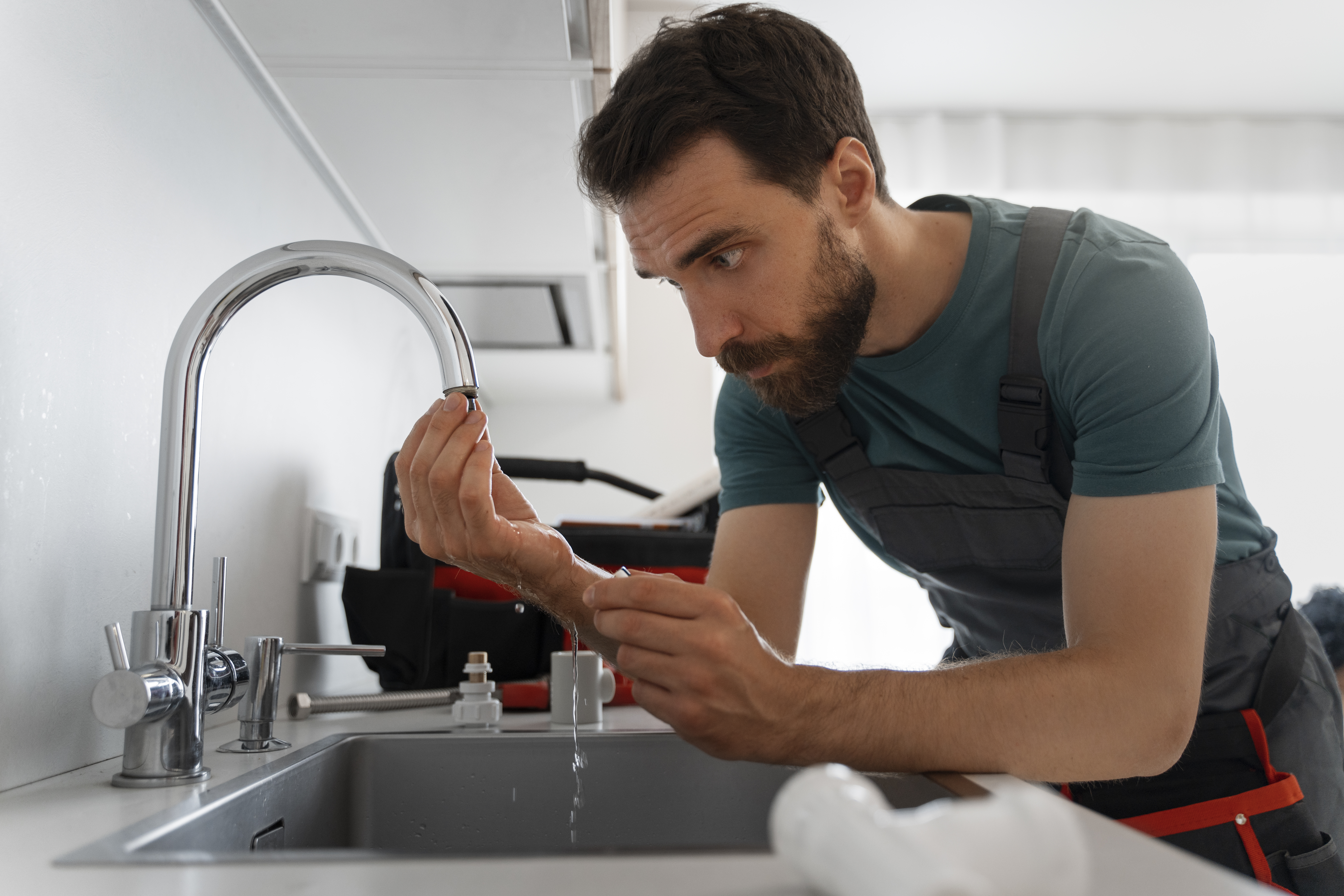- Home
- Plumbing Tips
- How Does a Water Softener Work in Dallas, TX: Operation Soft Water

- By: SEO Team 2
- 0 Comments
How Does a Water Softener Work in Dallas, TX: Operation Soft Water
In the heart of Dallas, TX, a silent enemy—hard water—wages war on your household water, plumbing, appliances, and even your skin and hair. Laden with calcium and magnesium, this adversary leaves a trail of destruction. But fear not, for there’s a strategic weapon in this battle—a water softener—and leading the charge is the elite operative, AAA AUGER Plumbing Services. Curious about how does a water softener work in Dallas? Picture a military campaign where AAA AUGER is the battle-hardened soldier, executing precision tactics to neutralize hard water and restore peace to your home.
The Enemy: Hard Water in Dallas, TX
Dallas water, sourced from limestone-rich aquifers, is notoriously hard, often exceeding 120 parts per million of mineral content. These aquifers have unique mineral compositions that contribute to the hardness of the water. This hardness creates a host of problems: clogged pipes, premature water heater failure, spotty dishes, and dry, itchy skin. Hard water is like an insidious guerrilla force, slowly undermining your home’s infrastructure. Without intervention, it can lead to costly repairs and reduced appliance lifespans.
The Weapon: How a Water Softener Works
A water softener operates like a well-orchestrated military campaign, using a process called ion exchange to eliminate hard water minerals. Here’s how it works, broken down into tactical maneuvers:
Infiltration (Water Entry)
Hard water enters the softener’s resin tank as it passes through the home’s water supply, the primary battlefield. This tank is filled with tiny resin beads, each charged with sodium or potassium ions, ready to engage the enemy.
Engagement (Ion Exchange)
As water flows through the resin tank, the calcium and magnesium ions—the hard water culprits—are attracted to the negatively charged beads. In a precise swap, the beads release sodium ions and capture the hardness minerals, effectively neutralizing them. This exchange transforms hard water into soft, slick water that’s gentle on your home.
Regeneration (Recharge Phase)
Over time, the resin beads become saturated with calcium and magnesium, losing their effectiveness. The softener initiates a regeneration cycle, like a soldier reloading ammunition. A brine solution, made from salt stored in a separate tank, washes over the beads, flushing out the trapped minerals and recharging the beads with sodium ions. The mineral-laden wastewater is then expelled through a drain line.
Victory (Soft Water Delivery)
With the resin beads recharged, the resulting softened water exits the softener and is delivered to your faucets, appliances, and showers. This continuous cycle ensures a steady supply of soft water, protecting your home from the ravages of hard water.
In Dallas, where water hardness can be particularly aggressive, a water softener is a critical defense. Regular maintenance, such as refilling the salt tank and scheduling professional checkups, keeps the system battle-ready.
The Benefits: Why Softened Water is Essential
Soft water is more than just a luxury; it’s a necessity for maintaining the health and longevity of your home’s plumbing system, appliances, and even your skin and hair. The process used in water softeners effectively removes magnesium and calcium ions, which are the primary culprits behind scaling and damage to pipes and appliances. By eliminating these hardness minerals, a water softener can significantly reduce the risk of mineral buildup, ensuring your plumbing system remains free from clogs and corrosion.
One of the most immediate benefits of soft water is the improvement in energy efficiency. Hard water can cause scale buildup. Soft water allows appliances to operate more efficiently, leading to noticeable savings. Additionally, soft water helps prevent frequent plumbing repairs by reducing the wear and tear on your pipes and fixtures.
Beyond the technical advantages, soft water also enhances your daily life. It improves the taste and smell of your drinking water, making it a more enjoyable experience.
Investing in a water softener offers numerous benefits, from improved water quality and reduced maintenance costs to enhanced overall comfort. By removing the hardness minerals through the ion exchange process, you can protect your home and enjoy the many advantages of soft water.
The Operation: Water Softener Installation

The water softener installation process is a critical operation that begins with a thorough assessment of your home’s plumbing system. This initial evaluation helps determine the specific needs of your household, including water usage and mineral concentration levels. Based on this assessment, a quality water softener system is selected to ensure optimal performance.
The water softener installation process involves connecting the water softener to your home’s water supply. This strategic placement ensures that all the water entering your home is treated. A brine tank is installed to hold the sodium or potassium chloride solution used in the ion exchange process. This tank works in tandem with the resin tank, which contains the resin beads responsible for removing mineral concentrations from the water.
Once the system is connected, it is programmed to periodically clean itself through a regeneration cycle. This cycle involves flushing out the resin beads and replenishing the brine solution, ensuring the system remains effective over time. A water softener monitor is also installed to track the system’s performance and detect any issues or maintenance needs.
Finally, the entire system is tested to ensure it is functioning properly and providing softened water throughout your home. This comprehensive installation process guarantees that your water softener operates efficiently.
The Budget: Water Softener Cost and Budgeting
Investing in a water softener involves an initial cost, but the long-term benefits and savings make it a worthwhile investment. The cost of a water softener can vary depending on the type and quality of the system, as well as the size of your household and its water usage. On average, a water softener can cost between $1,000 to $3,000, including installation.
In addition to the initial cost, homeowners need to budget for the ongoing expense of quality salt or potassium chloride pellets, which can range from $20 to $50 per month. However, the long-term benefits of a water softener, such as reduced energy bills and extended appliance lifespan, can help offset these costs. By improving the efficiency of your hot water heaters and other appliances, a water softener can lead to significant savings.
It’s also important to consider the cost of maintenance and repairs for the water softener system, which can range from $50 to $100 per year. Regular maintenance ensures the system remains effective and prevents costly breakdowns. Homeowners can explore financing options or rebates for water softener installation, making the system more affordable.
The Elite Soldier: Why Choose AAA AUGER
In this campaign against hard water, AAA AUGER Plumbing Services is the elite soldier you want leading the charge. Softened water is more than just a luxury; it’s a necessity for maintaining the right mineral balance in your home’s plumbing system, appliances, and even your skin and hair. With over 60 years of service in Texas, AAA AUGER combines tactical expertise, cutting-edge equipment, and a commitment to excellence. Here’s why we’re the Dallas plumber of choice for your water softener needs in Dallas:
Combat-Ready Expertise
-
- AAA AUGER’s licensed technicians are like special forces operatives, trained to install, repair, and maintain water softeners with precision.

- AAA AUGER’s licensed technicians are like special forces operatives, trained to install, repair, and maintain water softeners with precision.
Strategic Availability
-
- Hard water doesn’t wait for convenient hours, and neither does AAA AUGER. Our 24/7 emergency services ensure they’re ready to deploy at a moment’s notice, with no extra charges for evenings, weekends, or holidays.
Transparent Battle Plans
-
- AAA AUGER operates with full transparency, providing free inspections and upfront pricing before any work begins. Like a commander briefing troops, we explain all options, ensuring you’re in control of the mission without hidden costs.
Proven Track Record
-
- AAA AUGER has earned the trust of Dallas homeowners and businesses. Our commitment to quality is backed by positive reviews and a reputation for courteous, professional service.
Comprehensive Arsenal
-
- Beyond water softeners, AAA AUGER handles all plumbing challenges—leaks, water heaters, slab leaks, and more. This versatility makes us a one-stop command center for your home’s plumbing needs, ensuring long-term protection against hard water and other threats. By eliminating these hardness minerals, a water softener can significantly reduce the risk of mineral buildup, ensuring your plumbing system remains free from clogs and preventing clogged pipes.
The Stakes: Why Act Now
Ignoring hard water in Dallas is like letting an enemy advance unchecked. Scale buildup can reduce your heater’s efficiency, clog pipes, and shorten appliance lifespans, leading to costly repairs. This initial evaluation helps determine the specific needs of your household, including water usage and mineral concentration levels in your home’s water supply. Soft water, on the other hand, offers tangible benefits: smoother skin, cleaner dishes, brighter laundry, and lower energy bills due to improved appliance efficiency. By deploying a water softener with AAA AUGER, you’re not just defending your home—you’re enhancing its comfort and value.
Conclusion: Enlist AAA AUGER Today
Operation Soft Water is a critical mission for Dallas homeowners, and AAA AUGER Plumbing Services is the elite soldier you need to win the fight against hard water. Our expertise, availability, and transparent approach make them the ideal partner for installing and maintaining a water softener tailored to your home’s needs.
Homeowners need to budget for the ongoing expense of quality salt pellets, and for those on a low sodium diet, substitute potassium chloride pellets can be used. However, the long-term benefits of a water softener, such as reduced energy bills and extended appliance lifespan, can help offset these costs. Don’t let hard water sabotage your plumbing and appliances. Enlist AAA AUGER today by calling 972.222.2843 or visiting www.aaa-auger.com.
